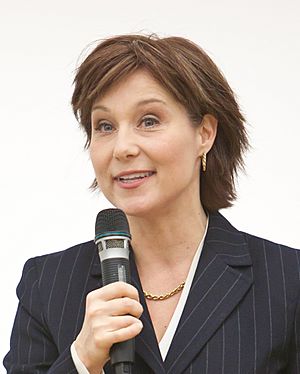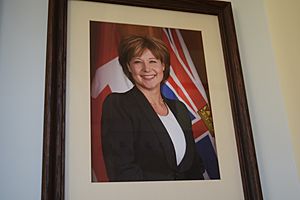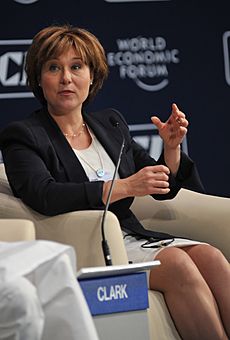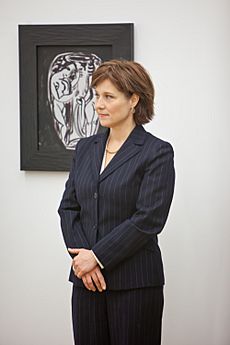Christy Clark facts for kids
Quick facts for kids
Christy Clark
|
|||||||||||||||||||||||||||||||||||||||||||||||||||||||||||
|---|---|---|---|---|---|---|---|---|---|---|---|---|---|---|---|---|---|---|---|---|---|---|---|---|---|---|---|---|---|---|---|---|---|---|---|---|---|---|---|---|---|---|---|---|---|---|---|---|---|---|---|---|---|---|---|---|---|---|---|

Clark in 2011
|
|||||||||||||||||||||||||||||||||||||||||||||||||||||||||||
| 35th Premier of British Columbia | |||||||||||||||||||||||||||||||||||||||||||||||||||||||||||
| In office March 14, 2011 – July 18, 2017 |
|||||||||||||||||||||||||||||||||||||||||||||||||||||||||||
| Monarch | Elizabeth II | ||||||||||||||||||||||||||||||||||||||||||||||||||||||||||
| Lieutenant Governor |
|
||||||||||||||||||||||||||||||||||||||||||||||||||||||||||
| Deputy |
|
||||||||||||||||||||||||||||||||||||||||||||||||||||||||||
| Preceded by | Gordon Campbell | ||||||||||||||||||||||||||||||||||||||||||||||||||||||||||
| Succeeded by | John Horgan | ||||||||||||||||||||||||||||||||||||||||||||||||||||||||||
| Leader of the Opposition in British Columbia | |||||||||||||||||||||||||||||||||||||||||||||||||||||||||||
| In office July 18, 2017 – August 4, 2017 |
|||||||||||||||||||||||||||||||||||||||||||||||||||||||||||
| Preceded by | John Horgan | ||||||||||||||||||||||||||||||||||||||||||||||||||||||||||
| Succeeded by | Rich Coleman | ||||||||||||||||||||||||||||||||||||||||||||||||||||||||||
| Leader of the BC Liberal Party | |||||||||||||||||||||||||||||||||||||||||||||||||||||||||||
| In office February 26, 2011 – August 4, 2017 |
|||||||||||||||||||||||||||||||||||||||||||||||||||||||||||
| Preceded by | Gordon Campbell | ||||||||||||||||||||||||||||||||||||||||||||||||||||||||||
| Succeeded by | Rich Coleman (interim) | ||||||||||||||||||||||||||||||||||||||||||||||||||||||||||
|
|||||||||||||||||||||||||||||||||||||||||||||||||||||||||||
| Personal details | |||||||||||||||||||||||||||||||||||||||||||||||||||||||||||
| Born |
Christina Joan Clark
October 29, 1965 Burnaby, British Columbia, Canada |
||||||||||||||||||||||||||||||||||||||||||||||||||||||||||
| Political party | BC Liberal | ||||||||||||||||||||||||||||||||||||||||||||||||||||||||||
| Spouse |
Mark Marissen
(m. 1996; div. 2009) |
||||||||||||||||||||||||||||||||||||||||||||||||||||||||||
| Education | Simon Fraser University (no degree) | ||||||||||||||||||||||||||||||||||||||||||||||||||||||||||
Christina Joan Clark (born October 29, 1965) is a Canadian politician. She served as the 35th premier of British Columbia from 2011 to 2017. Christy Clark was the second woman to become premier of BC. She was also the first female premier in Canada to lead her party to win the most seats in two elections in a row.
A member of the British Columbia Liberal Party, Clark was a Member of the Legislative Assembly (MLA) from 1996 to 2005. She was also the Deputy Premier from 2001 to 2005. This was during the first term of Gordon Campbell's government. She left politics in 2005 and hosted a radio talk show. After Gordon Campbell resigned, Clark won the 2011 leadership election. She then became premier.
She returned to the legislature after winning a by-election in Vancouver-Point Grey. This seat was left open by Gordon Campbell. The Liberals won again in the 2013 provincial election. In the 2017 provincial election, the Liberals won 43 seats. This was one seat short of a majority. After an agreement between the NDP and Green Party, Clark's government lost a vote. John Horgan, the NDP leader, became premier on July 18, 2017. Clark then announced she would resign as Liberal leader and leave provincial politics on August 4, 2017.
Contents
Early Life and Education
Christy Clark was born on October 29, 1965, in Burnaby, British Columbia. Her parents were Mavis Audrey and Jim Clark. Her father was a teacher and ran for the legislative assembly three times. Her mother was a family therapist.
Clark went to Burnaby South Senior Secondary. She later studied at Simon Fraser University (SFU), the Sorbonne in France, and the University of Edinburgh in Scotland. She studied political science and religious studies. She did not complete a degree at any of these universities.
In 2001, Clark had her only child, Hamish Marissen-Clark. This was with her then-husband Mark Marissen. Clark was the second woman in Canadian history to have a child while serving as a cabinet minister.
Early Political Career
Starting in Politics
Clark was active in student politics at SFU. In 1987, she was elected president of the campus Young Liberals. In 1989, she was elected student president. However, her election was cancelled due to rule violations.
Clark worked for the BC Liberal Party when they were not in power. In 1993, she moved to Ottawa to work for transport minister Doug Young. She returned to BC in 1996. New leader Gordon Campbell asked her to run for office.
Time in Opposition
Clark was first elected to the legislative assembly in the 1996 election. She represented the area of Port Moody-Burnaby Mountain. For the next five years, she spoke for the Official Opposition on topics like the environment, children and families, and public service. She also helped lead the BC Liberals' campaign for the 2001 election. In that election, the party won 77 out of 79 seats.
Serving in Government
After the BC Liberal Party won in 2001, Premier Gordon Campbell made Clark the Minister of Education and Deputy Premier. She introduced changes to increase accountability and give parents more choice in schools. These changes were not popular with teachers and some others. They argued that funding was not enough.
As Education Minister, Clark wanted to make the BC College of Teachers more independent. This was met with strong opposition from the British Columbia Teachers' Federation. In 2002, Minister Clark introduced laws that sent teachers back to work and stopped collective bargaining. Later, the BC Supreme Court found these decisions were not allowed by the constitution.
Clark was Deputy Premier when BC Rail was privatized. This led to a public discussion about the process. In 2001, the Liberal campaign had promised not to sell BC Rail.
In 2004, Clark became Minister of Children and Family Development. On September 17, 2004, Clark left provincial politics. She did not run for re-election in 2005. She said she wanted to spend more time with her young son.
Running for Mayor of Vancouver
On August 31, 2005, Clark announced she wanted to run for mayor of Vancouver. She sought the nomination of the Non-Partisan Association (NPA). On September 24, 2005, she lost the NPA's mayoral nomination to Sam Sullivan.
Radio Show and Columnist
Clark hosted The Christy Clark Show on CKNW 980 AM in Vancouver. This was from August 27, 2007, until December 2010. She left the show to run for the BC Liberal leadership. Clark also wrote weekly columns for the Vancouver Province and the Vancouver Sun newspapers. She was an election analyst for Global BC and CTV News Channel.
Leadership Campaign

On December 8, 2010, Clark announced she would seek to become the leader of the BC Liberal Party. She had often said she was not interested in a political career. However, polls showed she was a top choice to become the next leader and premier. Clark said she wanted a "family-first agenda." She presented herself as an outsider who could bring change.
Her ideas included having a provincial Family Day in February. She also suggested creating an office to check local government taxes. She wanted a more open government by holding 12 town hall meetings each year. Regarding the Harmonized Sales Tax (HST), she first wanted to cancel the planned vote. She later decided to continue with the vote.
Some worried that Clark's past links to the federal Liberal Party could divide the BC Liberals. The BC Liberals are a mix of federal Conservatives and Liberals. There were concerns that right-wing supporters might move to the British Columbia Conservative Party.
At the leadership meeting on February 26, 2011, Clark was elected leader of the BC Liberals. She won on the third vote, beating Kevin Falcon with 52 percent of the vote.
Premier of British Columbia (2011–2017)

Christy Clark became Premier of British Columbia on March 14, 2011. She announced a smaller cabinet on the same day. When she became premier, she did not have a seat in the legislature. Clark ran in former Premier Gordon Campbell's riding of Vancouver-Point Grey. She won against NDP candidate David Eby. Her win was the first time a ruling party won a by-election in 30 years.
After Clark became premier, the Liberal Party's support increased in polls. However, this boost was short-lived. Within months, the party fell behind the NDP again.
In 2012, several important cabinet members announced they would not run for re-election. This news affected her government. There was also public concern about the "Quick Wins" issue. This involved the Liberals using government resources for party activities related to ethnic groups.
During her time as premier, some people accused her of a conflict of interest. This was related to the sale of BC Rail when she was a minister. In April 2013, BC's Conflict of Interest Commissioner found that Clark was not in a conflict of interest.
In June 2022, a report from the Cullen Commission of Inquiry into Money Laundering in British Columbia was released. It stated that in 2015, the premier learned about large cash transactions at casinos. The report noted that despite this information, Ms. Clark did not ensure these funds were not accepted.
2013 Re-election Success
As the 2013 election neared, polls showed Clark was one of the least popular premiers in Canada. However, Clark ran a campaign focused on jobs, natural gas, and a "debt-free BC." During a televised debate, Clark challenged NDP leader Adrian Dix on his stance about the Kinder Morgan pipeline.
Clark surprised pollsters by leading her party to victory in the May 13, 2013, provincial election. This was the party's fourth win in a row, and her first as leader. The BC NDP had a 20-point lead at the start of the campaign. However, Clark personally lost her seat in Vancouver-Point Grey to NDP candidate David Eby. She was still allowed to be premier, but needed to win a by-election to sit in the Legislative Assembly.
On June 4, Clark announced she would run in a by-election for the Liberal seat of Westside-Kelowna. The current MLA, Ben Stewart, resigned to allow Clark to run there. Clark won the by-election on July 10, 2013, with over 60 percent of the vote.
Economic and Energy Policies
Under Clark, the party became more centrist. She raised the minimum wage and introduced a province-wide Family Day. Clark became premier after the 2008–09 recession. She kept government spending in check, presenting two budgets with deficits before a balanced one for 2013–14. This balanced budget included a tax increase for high-income British Columbians.
Clark's government aimed to use BC's natural gas reserves. She saw the natural gas industry as a big economic opportunity. While BC continued its carbon tax, Clark promised to freeze the rate during the 2013 election. She also announced in 2012 that any future pipeline crossing BC must meet five conditions. These included environmental rules and talks with Indigenous groups.
Race Relations Initiatives
In May 2014, Clark formally apologized for 160 past racist policies against Chinese-Canadians. She stated that these past actions were unacceptable today.
In October 2014, the British Columbia government cleared the names of First Nations leaders. These leaders had been sentenced to hang in the Chilcotin War in 1864. Clark said, "We confirm without reservation that these six Tsilhqot'in chiefs are fully exonerated for any crime or wrongdoing."
2017 Election and Aftermath
The BC Liberals planned a bridge to replace the Massey Tunnel. The government also put taxes on property purchases by foreign buyers in Metro Vancouver. They also offered no-interest loans to first-time home buyers.
Clark campaigned on her government's economic record. However, the opposition parties criticized her on issues like housing and transit. They also raised concerns about political fundraising rules. While BC had strong economic growth, some argued that the province was becoming more unequal.
In the 2017 general election, the BC Liberals won the most seats (43). This was more than the NDP (41) and Greens (3). However, they were one seat short of forming a majority government.
After the election, the Liberals talked with the Green Party. However, on May 29, 2017, the Greens made an agreement with the NDP instead. This allowed the NDP to form a minority government.
Clark's government did not give up power right away. Her new cabinet was sworn in on June 8. Clark then called the legislative assembly to see if her government had enough support. She gave a speech from the throne that included new funding and policies supported by the NDP and Greens. However, both the NDP and Green Party leaders said they would not support the Liberal government.
On June 29, Clark's government lost a vote of confidence. Clark then asked the Lieutenant Governor, Judith Guichon, for a new election. Guichon did not agree and refused to dissolve the legislature. Clark then resigned as premier. Guichon invited John Horgan to form a minority government, which took office on July 18.
On July 28, Clark announced she would resign as Liberal Party Leader and leave politics. This became effective on August 4, 2017.
Post-Premiership Activities
Christy Clark considered running in the 2020 Conservative Party of Canada leadership election. She later decided not to. She supported Jean Charest in the 2022 Conservative Party of Canada leadership election. Clark was part of the advisory council for Centre Ice Canadians in 2023. She left the group before it became the Canadian Future Party. She believed the group should focus on supporting centrist candidates within existing parties.
On June 27, 2024, she called for Justin Trudeau to resign as Prime Minister. This was after the Conservative party won a byelection in Toronto—St. Paul's. In September 2024, Clark gave a speech at the Ontario Liberal Party's annual meeting. In October 2024, she confirmed her interest in running for leadership if Justin Trudeau resigned.
After Trudeau announced his resignation on January 6, 2025, Clark was considered a possible candidate in the 2025 Liberal Party of Canada leadership election. She had been learning French. On January 10, she said she was seriously thinking about running. She later apologized for mistakenly saying she never had a Conservative membership. On January 14, 2025, she decided not to enter the race. She mentioned her lack of French fluency and the short time frame for the race.
After Mark Carney became prime minister, his team tried to get Clark to run in the 2025 federal election. On March 24, 2025, Clark announced she would not be running in the election.
Images for kids
 | James B. Knighten |
 | Azellia White |
 | Willa Brown |





